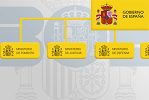Voting from abroad
Content
Requirements for Spanish citizens to vote in Spanish elections while living in another EU Member State
Spanish voters resident in other countries can vote in elections for deputies, senators, members of legislative assemblies of autonomous communities, members of assemblies of the autonomous cities of Ceuta and Melilla, and members of the European Parliament (in the latter case, if they have opted to vote in Spain). To do so, they must be registered in the census of absent resident voters living abroad (CERA) that is valid for the elections held.
They cannot vote in municipal elections in Spain.
Spanish voters who are temporarily abroad can vote in all elections.
Conditions for voting in elections in Spain
Permanent residents abroad
Spaniards who are permanently residing abroad may vote in the General Elections, elections to the European Parliament and the Autonomous Elections. To do so, they must be registered in the census of absent resident voters living abroad (CERA) that is valid for the elections held.
They cannot, however, vote in municipal elections.
The Provincial Delegations of the Electoral Census Office will automatically send the following documentation to the registered address of each person of Spanish nationality who is on the electoral census of resident-absent voters living abroad:
- Voting envelopes
- Two identical certificates of registration on the electoral census of resident-absent voters living abroad.
- Envelope addressed to the Regional Electoral Board.
- Envelope addressed to the Consulate or Embassy.
- An information sheet on how to exercise the right to vote and the address of the official website where candidates will be displayed and where downloadable sets of ballot papers will be available.
- The list of centres authorised for voting by ballot box in their consular area.
The Electoral Registration Office must send the documents by registered post within a period of 18 days, and no later than the 25 days, after the date on which the election is called. This period must take account of the time needed for documents to reach the address abroad.
In addition, the Electoral Registration Office will send the official ballot papers to the registered address of each resident-absent voter within a period of 29 days and no later than 33 days following the election call, in those provinces where the declaration of candidates has not been contested, and in the remaining provinces no later than day 39.
The ballot papers can also be downloaded at www.ine.es![]() .
.
In order to ensure the secrecy of the vote, only the complete set of ballot papers may be downloaded electronically.
The downloadable ballot papers will be available as soon as any opposition against the declaration of candidates has been resolved and no later than day 5 after the declaration of candidates.
The consular offices will ensure the availability of official ballot papers at the voting centres, as well as voting envelopes and the necessary computer equipment for downloading the rest of the documentation required to vote during the days set for voting in person.
Preparation of the vote
The ballot paper corresponding to the selected candidate will be put inside the voting envelope (or the envelope is left empty if the voter wishes to abstain).
In the envelope addressed to the Regional Electoral Board, the following are put:
- Voting envelope with the ballot paper.
- One of the certificates of registration on the electoral census (if the voter is going to vote by post, the back of the certificate must be signed by the voter and indicate their passport number or ID card number).
- Photocopy of the passport or ID card issued by the Spanish authorities, or certificate of nationality or registration in the Consular Registration Register issued by the Spanish Consulate in the country of residence.
Voters will be able to:
1.- Cast their vote in person in the ballot boxes set up for this purpose at their embassy or consulate or at centres set up for this purpose, between day 8 and day 3, inclusive, prior to the election day.
Prior to showing their ID, they must give the consular official the second certificate of registration on the electoral census and deposit the envelope addressed to the Regional Electoral Board. The consular official signs the back of said envelope and stamps it with the consular office stamp showing the date of its deposit.
2.- To send it by registered post no later than day 5 before the election day.
In this case, the following must be enclosed in the envelope addressed to the Consulate or Embassy:
- Envelope addressed to the Regional Electoral Board with the following content:
- Voting envelope with the ballot paper.
- The certificate of registration on the electoral census, the back of which must be signed by the voter and indicate the passport number or ID card number.
- Photocopy of the passport or ID card issued by the Spanish authorities, or certificate of nationality or registration in the Consular Registration Register issued by the Spanish Consulate in the country of residence.
- The certificate of registration on the electoral census.
- If you need it, the completed form for the reimbursement of delivery costs in those countries where no mail points have been opened.
It will be essential for the validity of these votes that the envelope addressed to the relevant Electoral Board clearly shows the stamp of the Office of the Consular Post or Consular Section of the relevant Diplomatic Mission, which indisputably certifies compliance with the relevant time limits.
Once the period for depositing the vote in the ballot box has expired, all votes (received by post or deposited in a ballot box) must be sent to the Office set up for this purpose at the Ministry of Foreign Affairs, European Union and Cooperation, which will proceed to forward them urgently to the Electoral Boards responsible for counting the votes.
All this information is available at ‘Electoral info’ webpage , at the Embassy or Consulate and at exteriores.gob.es and ine.es .
Temporary residents abroad (‘ERTA’ vote)
You may find yourself in one of these situations:
- You are a Spanish citizen and you are abroad temporarily. In this case, you can vote in all elections held in Spain.
- You are a non-national citizen resident in Spain: you are registered on the electoral census of non-national voters resident in Spain and you are abroad temporarily. In this case, you will only be able to vote in municipal elections and in European elections (if you are a citizen of the European Union).
The procedure to follow is as established in Royal Decree 1621/2007, of 7 December , summarised below:
- You can get the application form from consulates and embassies.
- You must submit the completed application in person to the consulate or embassy.
- To file an application, you must be registered as a non-resident on the Consular Registration Register. Both procedures (application to register and to vote) can be completed in one transaction.
Once the candidates have been declared, and the period for contesting has ended, the Electoral Census Office will send you the following documentation so that you can exercise your right to vote:
- An information sheet.
- Ballot papers and voting envelopes.
- Your certificate of registration on the electoral census.
- An envelope addressed to the relevant Voting centre.
- A form for reimbursing the costs of posting the vote.
All this information is available on the ‘Electoral info’ website .
Information for each Autonomous Community







Andalucía Aragón Asturias, Principado de Balears, Illes Canarias Cantabria Castilla y León Castilla-La Mancha Cataluña Ciudad de Ceuta Ciudad de Melilla Comunitat Valenciana Extremadura Galicia Madrid, Comunidad de Murcia, Región de Navarra, Comunidad Foral de País Vasco Rioja, La
Legal and/or technical references
-
Organic Law 5/1985, of 19 June 1985, on the General Electoral System Articles 31, 32, 35, 36, 38, 39, 74 and 75.

-
Royal Decree 1621/2007, of 7 December 2007, governing a voting procedure for Spanish citizens who are temporarily abroad

-
Resolution of 27 October 2014 of the Electoral Census Office on complaints about data entered on the electoral roll

-
Order Int/358/2015, of 27 February 2015, amending Annex 6 of Royal Decree 605/1999, of 16 April 1999, on supplementary regulation of electoral procedures (Official Gazette – BOE – No 54 of 4 March 2015)

-
Electronic Office of the Ministry of the Interior

-
‘Infoelectoral’ website

-
Organic Law 12/2022, of September 30th, on the reform of Organic Law 5/1985, of June 19th, on the General Electoral System, for the regulation of the exercise of voting by Spaniards living abroad.











